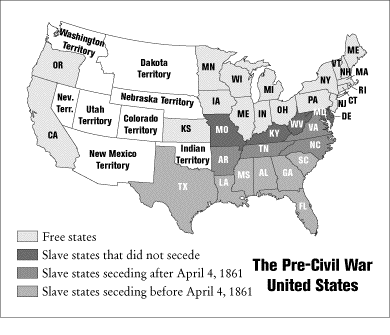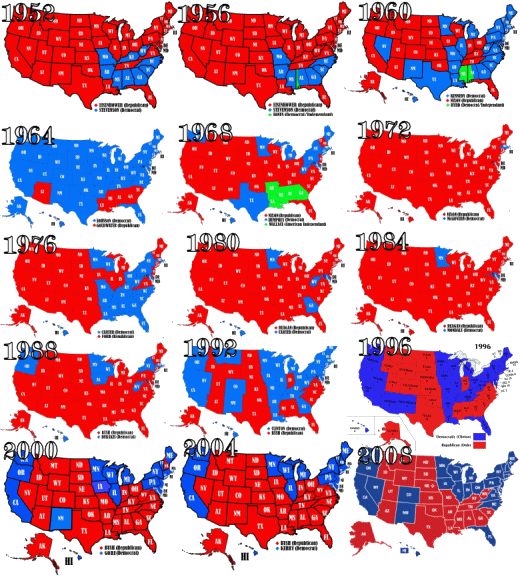How Rand Paul’s libertarian streak ran afoul of history
Atlanta Journal Constitution
by Jay Bookman
May 27, 2010
Some of you may remember the famous Jesse Helms ad of 1990 in his race against Democrat Harvey Gantt, a black man. It featured a pair of white hands angrily crumpling up a letter, while the announcer explained that the man had just been informed that he didn’t get a job because a less qualified minority did. Until this week, when I ran across the political flyer to the right from the 1964 campaign, I didn’t fully appreciate the rich political heritage behind the Helms ad, or why it drew such a strong reaction. In ‘64, in the wake of the signing of the Civil Rights Act by President Johnson, Barry Goldwater and his advisers had decided that their best chance was to play to white Southern resentment by pitting white against black on economic terms [To be fair, it was an age-old tactic that southern Democrats had been using at the state and local levels for decades to keep themselves in power]. The text of the flyer is a little blurry, so let me make it clear:
EMPLOYEES READ THIS:
Did you know that Lyndon Johnson’s Civil Rights Bill can get you fired from your job and give it to a person of another race? No matter what ability you have to do your job … or how much seniority you have on your job … you can lose your job because of Johnson’s Civil Rights Bill. This is your last chance. Vote to put an end to racial favoritism…vote to protect your job…your family…your home.EMPLOYERS READ THIS:
This is your last chance to save your freedom to run your own business as you choose!As I’ve tried to make clear, I believed Senate candidate Rand Paul when he insisted that his [now-retracted] opposition to the Civil Rights Act was based on strict libertarian principles rather than racism. On a purely intellectual level, you can make a valid if unconvincing argument to that effect. But the strong similarity between that position and the clear appeal to racism in the flyer helps explain why the public reacted so strongly to Paul’s argument, however based in principle it might be. Paul was naive to expect any other reaction.The flyer is also an artifact of a transition point in U.S. politics. In 1960, in a race that was decided by a razor-thin margin nationwide, Democrat John F. Kennedy defeated Republican Richard M. Nixon in Georgia by the overwhelming margin of 62.5 percent to 37.4 percent. Even Kennedy’s Catholicism couldn’t threaten the South’s strong ties to the Democratic Party. And yes, Catholicism was still an issue back then in the South. My Virginia-born grandmother, I’m told, was not very happy to be introduced to my father’s Catholic bride-to-be.
Four years later, after LBJ’s signing of the Civil Rights Act and Goldwater’s embrace of the tactics exemplified by the flyer, everything changed and Georgia voted Republican for the first time ever. Again, it wasn’t even close, with Goldwater pulling 54.1 percent to LBJ’s 45.9 percent. The only other states that Goldwater carried that year — in addition to his native Arizona — were South Carolina, Alabama, Mississippi and Louisiana, none of which had voted Republican since Reconstruction.
Jay Bookman is a usually right-thinking Atlanta columnist, and I think his point is correct. Rand Paul focused on the heavy-handedness of the 1964 Civil Rights Act and tried to claim that it was the government over-reaching its authority – the big issue for the Libertarians. He grew up in an affluent conservative family in Texas [a western state], then settled in Kentucky [in the South, Kentucky is still considered a border state].

If you lived in the South, you wouldn’t need that flyer up there to know what Bookman is saying. The South was segregated because of racism, pure and simple. Back in those days, the fight to perpetuate segregation was hidden behind "States Rights," just like the formation of the Confederacy was cloaked in a similar complaint, but if you grew up where I grew up, even as a kid you knew that was just a smoke screen.
 Maybe I’ll spot Rand Paul that he hasn’t really experienced what it was like here back in those days. He was one year old when the Civil Rights Bill was passed in 1964. And maybe a doctor’s kid in Texas or an adulthood in Durham and Bowling Green isolated him from the facts, but to see the Civil Rights Act as an inappropriate use of power is naive [Bookman]. I think blind is more like it. For those of us who were white southerners involved in the fight for civil rights in the South, the victory was a hard one. Segregation was a huge thing, and the 1964 Civil Rights Act was just the end of the beginning. It wasn’t just the change in Party affiliation that mattered to life here. There was "white flight" that changed the landscape of our cities. There was the massive growth of private schools at the expense of the public schools. There were huge demographic shifts. In the "Old South" [LA, MS, AL, GA, SC], you could have probably have more easily decreed that we all spoke a new language.
Maybe I’ll spot Rand Paul that he hasn’t really experienced what it was like here back in those days. He was one year old when the Civil Rights Bill was passed in 1964. And maybe a doctor’s kid in Texas or an adulthood in Durham and Bowling Green isolated him from the facts, but to see the Civil Rights Act as an inappropriate use of power is naive [Bookman]. I think blind is more like it. For those of us who were white southerners involved in the fight for civil rights in the South, the victory was a hard one. Segregation was a huge thing, and the 1964 Civil Rights Act was just the end of the beginning. It wasn’t just the change in Party affiliation that mattered to life here. There was "white flight" that changed the landscape of our cities. There was the massive growth of private schools at the expense of the public schools. There were huge demographic shifts. In the "Old South" [LA, MS, AL, GA, SC], you could have probably have more easily decreed that we all spoke a new language.
I wish there had been another way, but there wasn’t. It was as big an exception as the Civil War itself. What I personally think is that the beginning of the end has barely begun even now. And unfortunately, the resentment against the government from those days has spread from the old South to the "territories" – that great white [red] swath in the center of the country.
But the point is that Rand Paul’s notion that the Civil Rights Act was an overstepping of the Federal Government’s charge or interfering in business owner’s rights is absurd. It was a perilously long-overdue righting of a great National wrong. Separate but Equal was an unthinkable trick that shamed everything about our Constitution. I’ll bet that even the southern conservative republicans would agree with that. If there were a referendum right now in the South, I believe we would vote down Segregation – even if only white people voted. That is not to say that the resentment about the Civil Rights Act is gone, or will be gone for a very long time. Children of parents who are appropriately strict may later agree with their parents limits, reproduce them with their own children, but their anger at their parents persists [if what they say in psychotherapy years later in any indicator]. As Bookman says, "Paul was naive to expect any other reaction." I would go further. I would say that if Rand Paul really were not a racist, he would just know that what he said was idiotic [and I don’t think Rand Paul would’ve marched with Martin Luther King].

Dominant US Ethnicity


I have been reading Joseph Ellis (Founding Brothers, His Excellency, George Washington) about the early days of our country, and how it could not have been formed without the deliberate decision to avoid the issue of slavery. About 20% of the population were slaves, Washington himself having around 300. States rights was used as a cover to preserve slavery then as it is now being used to promote racial causes. Your article shows how much this divisive issue is still with us in a big way. Washington set important precedents like taking his instructions from elected bodies during the war of independence and later by stepping down from the presidency and not starting a new monarchy, as many wanted him to do. Ellis speculates on the effect it would have had if only Washington had freed his slaves during his lifetime, given his huge and never to be repeated popularity and influence.